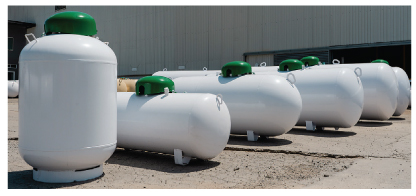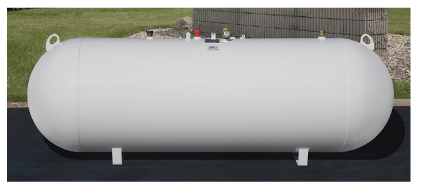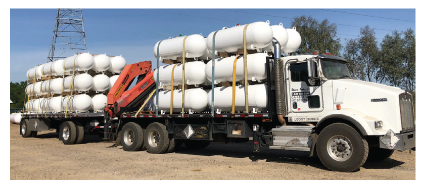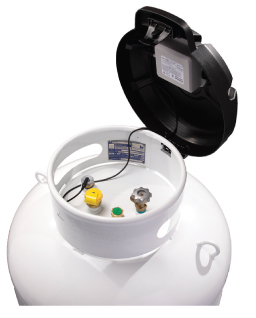Monday, October 5, 2020
Full service from a one-stop shop, personalized service from regional sales staff, swift delivery from an expanded fleet, tank monitoring integrated into tanks or lids, and tanks in sizes needed to provide additional storage for both marketers and their customers. Those are some of the products and services rolled out or expanded in recent months by five companies that manufacture and/or refurbish propane tanks. 
These would have been highlighted at trade shows this past spring and summer, had those events not been postponed due to the COVID-19 pandemic. In the absence of trade shows, live displays, and in-person discussions, BPN checked in with these five vendors to learn what’s new and what’s trending in the marketplace for propane tanks. In their answers, they highlighted service, dependability, and innovation.
LPG Ventures (Kearney, Mo.) manufactures LPG storage tanks in stock sizes ranging from 12,000 gallons to 90,000 gallons and custom-fabricated sizes up to 120,000 gallons. In addition, it is a full-service LPG systems company, providing design, manufacturing, engineering, wholesale equipment, transportation, and construction. LPG Ventures offers sales and service nationwide.
“We build the tank, haul it to you, and install it,” Ian Baanders, sales manager, tells BPN. “It makes things a lot easier when you don’t have to have different contractors pointing fingers at each other.”
For propane marketers, LPG Ventures builds, expands, and maintains bulk plants. These typically use 12,000-, 18,000-, or 30,000-gal. tanks. “We work for majors and for startups,” Baanders says. “Most propane marketers have a bulk plant and we will see them when they are refurbishing, installing new, or adding an autogas project.”
Other customers for the company’s propane tanks and services include federal and state buildings and hospitals that are required to have two sources of fuel, and farmers that need bulk storage of propane for grain drying.
LPG Ventures can fabricate storage vessels to suit the customer’s choice of either standard installation or skid-mounted option. The company also offers a wide variety of used and refurbished tanks, in addition to new.

“Our tanks are built here in the U.S.,” Baanders says. “We are also willing to look at custom, one-off projects. Our midlevel size gives us the opportunity to do some things the big guys wouldn’t.”
“Between our turnkey skid packages and our tanks, we can install things quickly and have the piping done in a manufacturing environment rather than in the field, where it would be subject to the weather. We deliver a finished product, where others would do it onsite.”
When LPG Ventures exhibits at trade shows, it often displays something different to show that the company does more than just tanks. Last year, they displayed a propane transloader. If shows had been held this year, LPG Ventures would have shown a skid tank.
“If we had gone to trade shows this year, we probably would have talked about the low propane prices and why now is a good time to put in bulk storage,” Baanders says.
Propane marketers have been adding storage, Baanders reports. “We’re seeing a lot of farmers doing it, too,” he adds. “That wasn’t as common. Sometimes a farmer with a large grain dryer would put in a 12,000-gal. tank, but now they’re putting in a 30,000-gal. tank. That allows them to buy all their fuel during the summer rather than getting multiple deliveries during the drying season.”
For more information, visit www.lpgventures.com.
Metsa Tanks (Monterrey, Mexico) has expanded its capabilities in both products and services. “We like to be as empathetic as possible towards our customers as to imagine their needs, hurts, and wants and turn our tank into more than a product, a solution,” says Robert Kenney, managing director.
To that end, the company has added to its sales staff, expanded its fleet, introduced a premium prime coated tank, added tanks with a pre-installed monitor, and launched its first autogas-specific product.

The sales staff now includes five people, up from one a year ago. They are distributed regionally to ensure a more personalized experience. Three cover the United States, one covers Mexico, and one covers Canada.
The expanded fleet enables Metsa to deliver faster, unload using its own equipment, and not rely on third-party logistics. With its own drivers, the company can guarantee customer service. It also can guarantee three-week delivery for standard products.
The Premium Prime Coated tanks feature a zinc-heavy primer as well as a top coat. The goal is to extend the paint life on the products and withstand adverse, highly saline environments.
The Metsa Smart Tank, featuring a pre-installed monitor, has been developed in partnership with Nube. This solution aims to facilitate the transition to digital monitoring as much as possible. “Marketers and service technicians will literally only have to pass a magnet over the monitor to activate it, that’s it,” Kenney explains.
The expansion into the autogas sector began with the launch of Metsa’s 1990-gal. station tanks in early August.
These new products join Metsa’s existing lineup of 120- to 1000-gal. tanks. The company’s 500- and 1000-gal. tanks are wider and shorter. This allows the company to transport more tanks to customers, bringing down freight costs. On a 53-ft trailer, Metsa can fit 38 500-gal. tanks or 19 1000-gal. tanks, which is about 20% more than standard designs.
“Quality and service will always be the top factors when comparing options for where to buy, and we take these items very seriously, but I also like to focus our efforts into areas that are often overlooked by manufacturers and customers alike,” Kenney concludes. “These include aspects such as timeliness with a response for a quote so the customer can make his decision promptly. We also put a lot of value in flexibility in the negotiation regarding specific requests such as yearly planned deliveries, valve accommodations/adjustments, deliveries, expedites, etc. Metsa is a small, family-owned company that maintains this style of doing business even through rapid growth.”
For more information, visit www.metsa.com.
When Quality Steel (Cleveland, Miss.) started out 60 years ago, propane tank manufacturers could differentiate themselves with a quality product. Before moving into the propane tank business, the founder of the company owned five retail propane companies. “He was tired of buying poor quality tanks,” says Lynn Hardin, vice president of sales and marketing.
Today, Hardin adds, manufacturers must set themselves apart with the quality of their service. “Everybody basically builds the same tank,” he says. “What separates the companies is the quality of the tank and service, prior to the sale and after the sale. If a problem occurs, how does a company handle it?”
Quality Steel has built its reputation in a number of ways, he says. The company builds relationships with customers and keeps them up to date by employing a very seasoned group of regional sales managers and equipment distributors. It remains actively involved in the industry by encouraging team members to participate in NPGA, state associations, and PERC. “We have people who are active members of committees and who have been presidents of state associations,” Hardin notes.
It makes customers’ tank business easier by supplying a five-year warranty on aboveground tanks. “More importantly, when there is an issue, we resolve it quickly with our team.” The company also offers dependable delivery. “When we tell you when the tanks are coming, that’s when they’re coming.” Hardin adds, “We are constantly working very hard to improve our level of service to the customer. Over the past several years we have made the commitment to Lean manufacturing, and the results are paying off. We have eliminated some waste and developed new methods for processes. This also helps make sure we deliver an on-time, quality product.”
In terms of products, Quality Steel offers aboveground, above/underground, and underground tanks in sizes from 120 to 1990 gallons. In addition to offering new tanks for sale, it provides recertification and refurbishing for tanks of all sizes through its sister company LP Cylinder Service. The company does business in all 50 states and in 10 countries in addition to the U.S.
Though the tanks haven’t changed much over the last 40 years, the size of tanks people are buying has been trending larger. “The 500-gal. and 1000-gal. tanks have been king for a long time. Now there is a shift to 1000s,” Hardin reports. “Customers who used to use only 500-gal. tanks, now use half 500-gal. and half 1000-gal.”
This may be currently due in part to growing demand for tertiary storage, in response to the logistical issues in the supply of propane. “Propane dealers may have to drive much further than they used to, to get propane for their bulk tank,” Hardin says. “Storage is always an important factor for propane dealers, but during supply or logistical problems it is even bigger.”
“There are different forms of storage,” he adds. “People typically think of the 30,000-, 60,000-, and 90,000-gal. tanks at a bulk plant, but storage also comes in the form of tanks at customer locations. One thing we are stressing to our customers now is, we can provide that tertiary storage in a trusted and dependable manner.”
For more information, visit www.propanetank.com.
Shasta Tanks (Anderson, Calif.) offers refurbished propane tanks that cost about two-thirds what a new tank would cost. The company was launched in 2014 by propane marketer Chuck Kinnie. As the owner of Shasta Gas Propane, he saw a need for tank refurbishing, and formed another corporation to offer that service to other propane companies.
Today, Shasta Tanks’ customers include more than 30 companies with locations in California, Arizona, Nevada, and Oregon. The company refurbishes propane tanks in sizes from 120 gallons to 1000 gallons. It sells refurbished tanks as well as refurbishing customers’ tanks. The company can pick up tanks and deliver them back to the customer after refurbishing.
During the refurbishing, the tank goes in the company’s blasting machine. “It comes out free of old paint and rust—it looks like new steel,” Kinnie says. A two-part polyurethane paint is then applied. “This coating is hard, durable, and shiny,” he says. “This is specced out for bridges in the state of California. It has a 15-year life expectancy in any weather—rain or sun.” New RegO valves are installed. The tank is then vacuum purged and tested for leaks.
To deliver the tanks, Shasta Tanks has two large Class A trucks equipped with 40-ft knuckleboom cranes. Each truck and trailer can carry 45 250-gal. tanks or an assortment of 500-gal., 250-gal., and 120-gal. tanks. “We can bring different sizes on a truckload,” Kinnie says. “We load up any size the customer wants to order. Then we can come into their yard and set the tanks neatly.”
Shasta Tanks currently has more than 3000 tanks available to refurbish. The company has limited access to 1000-gal. and 500-gal. tanks, so it stocks brand-new tanks in those sizes as a service to customers who are also buying refurbished tanks.
“No one wants 150-gal. tanks anymore,” Kinnie adds. “They have moved to bigger tanks, for efficiency and bigger gas deliveries to their customers.”
“It costs a retail propane company about $40 to deliver propane to a house, so the way to make money is to make fewer, larger deliveries,” he explains. “If the customer doesn’t like that, you try to get them on a monthly installment program.”
“That’s been happening over the last four years. Today, retail propane companies want 250-gal. or 500-gal. tanks.”
For more information, visit www.shastatanks.com or email
This email address is being protected from spambots. You need JavaScript enabled to view it..
Worthington Industries (Columbus, Ohio) has launched two new products designed to meet the needs of propane marketers and consumers.
For consumers, the company now offers its ComfortCarry 20-lb cylinder. This features a more ergonomic handle, better weight distribution, and smoother edges to make it more comfortable for the person carrying it. It also features a collar that is less likely to rust. “We have studied the attitudes and attributes of consumers in the 20-pound space,” Bobby Weinberg, product director, tells BPN. “We understand their pain points and how we can address them. Comfort is the first, and we will soon hit on others.” To meet the needs of propane marketers who want to make sure they fill tanks at the optimal time, Worthington Industries is now rolling out an integrated lid and tank monitor called SmartLid. Developed in partnership with Otodata Tank Monitors, this features an Otodata tank monitor integrated into protective polypropylene lid. “This ensures consistent placement of the monitor on top of the tank and a guaranteed signal,” Weinberg explains. “It also features dual SIM technology for the best service.” The lid is durable and was designed to house this specific monitor. SmartLid fits Worthington Industries’ 420-lb and 200-lb tanks, which have collars of the same diameter.
To meet the needs of propane marketers who want to make sure they fill tanks at the optimal time, Worthington Industries is now rolling out an integrated lid and tank monitor called SmartLid. Developed in partnership with Otodata Tank Monitors, this features an Otodata tank monitor integrated into protective polypropylene lid. “This ensures consistent placement of the monitor on top of the tank and a guaranteed signal,” Weinberg explains. “It also features dual SIM technology for the best service.” The lid is durable and was designed to house this specific monitor. SmartLid fits Worthington Industries’ 420-lb and 200-lb tanks, which have collars of the same diameter.
“We have been focused on innovation and ways to differentiate ourselves,” Weinberg says. “We are helping marketers improve their efficiency and work safer. The tank space has been stagnant—people say, ‘a tank is a tank’—but we differentiate ourselves with quality, delivery, and innovation. We have been manufacturing cylinders for over 45 years. We have always been easy to work with, we are a domestic manufacturer, we offer quick delivery, we have expertise, and we have local representation in every key market.”
“We always make sure we have the right product,” he adds. “For example, we don’t see a lot of 200-lb business anymore; the 420-lb has become the standard. We have seen that shift in the size tanks LP gas marketers use, so we make sure we have the right size, material, and price.”
For more information, visit www.worthingtonindustries.com/lpg. — Steve Relyea

These would have been highlighted at trade shows this past spring and summer, had those events not been postponed due to the COVID-19 pandemic. In the absence of trade shows, live displays, and in-person discussions, BPN checked in with these five vendors to learn what’s new and what’s trending in the marketplace for propane tanks. In their answers, they highlighted service, dependability, and innovation.
LPG Ventures (Kearney, Mo.) manufactures LPG storage tanks in stock sizes ranging from 12,000 gallons to 90,000 gallons and custom-fabricated sizes up to 120,000 gallons. In addition, it is a full-service LPG systems company, providing design, manufacturing, engineering, wholesale equipment, transportation, and construction. LPG Ventures offers sales and service nationwide.
“We build the tank, haul it to you, and install it,” Ian Baanders, sales manager, tells BPN. “It makes things a lot easier when you don’t have to have different contractors pointing fingers at each other.”
For propane marketers, LPG Ventures builds, expands, and maintains bulk plants. These typically use 12,000-, 18,000-, or 30,000-gal. tanks. “We work for majors and for startups,” Baanders says. “Most propane marketers have a bulk plant and we will see them when they are refurbishing, installing new, or adding an autogas project.”
Other customers for the company’s propane tanks and services include federal and state buildings and hospitals that are required to have two sources of fuel, and farmers that need bulk storage of propane for grain drying.
LPG Ventures can fabricate storage vessels to suit the customer’s choice of either standard installation or skid-mounted option. The company also offers a wide variety of used and refurbished tanks, in addition to new.

“Our tanks are built here in the U.S.,” Baanders says. “We are also willing to look at custom, one-off projects. Our midlevel size gives us the opportunity to do some things the big guys wouldn’t.”
“Between our turnkey skid packages and our tanks, we can install things quickly and have the piping done in a manufacturing environment rather than in the field, where it would be subject to the weather. We deliver a finished product, where others would do it onsite.”
When LPG Ventures exhibits at trade shows, it often displays something different to show that the company does more than just tanks. Last year, they displayed a propane transloader. If shows had been held this year, LPG Ventures would have shown a skid tank.
“If we had gone to trade shows this year, we probably would have talked about the low propane prices and why now is a good time to put in bulk storage,” Baanders says.
Propane marketers have been adding storage, Baanders reports. “We’re seeing a lot of farmers doing it, too,” he adds. “That wasn’t as common. Sometimes a farmer with a large grain dryer would put in a 12,000-gal. tank, but now they’re putting in a 30,000-gal. tank. That allows them to buy all their fuel during the summer rather than getting multiple deliveries during the drying season.”
For more information, visit www.lpgventures.com.
Metsa Tanks (Monterrey, Mexico) has expanded its capabilities in both products and services. “We like to be as empathetic as possible towards our customers as to imagine their needs, hurts, and wants and turn our tank into more than a product, a solution,” says Robert Kenney, managing director.
To that end, the company has added to its sales staff, expanded its fleet, introduced a premium prime coated tank, added tanks with a pre-installed monitor, and launched its first autogas-specific product.

The sales staff now includes five people, up from one a year ago. They are distributed regionally to ensure a more personalized experience. Three cover the United States, one covers Mexico, and one covers Canada.
The expanded fleet enables Metsa to deliver faster, unload using its own equipment, and not rely on third-party logistics. With its own drivers, the company can guarantee customer service. It also can guarantee three-week delivery for standard products.
The Premium Prime Coated tanks feature a zinc-heavy primer as well as a top coat. The goal is to extend the paint life on the products and withstand adverse, highly saline environments.
The Metsa Smart Tank, featuring a pre-installed monitor, has been developed in partnership with Nube. This solution aims to facilitate the transition to digital monitoring as much as possible. “Marketers and service technicians will literally only have to pass a magnet over the monitor to activate it, that’s it,” Kenney explains.
The expansion into the autogas sector began with the launch of Metsa’s 1990-gal. station tanks in early August.
These new products join Metsa’s existing lineup of 120- to 1000-gal. tanks. The company’s 500- and 1000-gal. tanks are wider and shorter. This allows the company to transport more tanks to customers, bringing down freight costs. On a 53-ft trailer, Metsa can fit 38 500-gal. tanks or 19 1000-gal. tanks, which is about 20% more than standard designs.
“Quality and service will always be the top factors when comparing options for where to buy, and we take these items very seriously, but I also like to focus our efforts into areas that are often overlooked by manufacturers and customers alike,” Kenney concludes. “These include aspects such as timeliness with a response for a quote so the customer can make his decision promptly. We also put a lot of value in flexibility in the negotiation regarding specific requests such as yearly planned deliveries, valve accommodations/adjustments, deliveries, expedites, etc. Metsa is a small, family-owned company that maintains this style of doing business even through rapid growth.”
For more information, visit www.metsa.com.

When Quality Steel (Cleveland, Miss.) started out 60 years ago, propane tank manufacturers could differentiate themselves with a quality product. Before moving into the propane tank business, the founder of the company owned five retail propane companies. “He was tired of buying poor quality tanks,” says Lynn Hardin, vice president of sales and marketing.
Today, Hardin adds, manufacturers must set themselves apart with the quality of their service. “Everybody basically builds the same tank,” he says. “What separates the companies is the quality of the tank and service, prior to the sale and after the sale. If a problem occurs, how does a company handle it?”
Quality Steel has built its reputation in a number of ways, he says. The company builds relationships with customers and keeps them up to date by employing a very seasoned group of regional sales managers and equipment distributors. It remains actively involved in the industry by encouraging team members to participate in NPGA, state associations, and PERC. “We have people who are active members of committees and who have been presidents of state associations,” Hardin notes.
It makes customers’ tank business easier by supplying a five-year warranty on aboveground tanks. “More importantly, when there is an issue, we resolve it quickly with our team.” The company also offers dependable delivery. “When we tell you when the tanks are coming, that’s when they’re coming.” Hardin adds, “We are constantly working very hard to improve our level of service to the customer. Over the past several years we have made the commitment to Lean manufacturing, and the results are paying off. We have eliminated some waste and developed new methods for processes. This also helps make sure we deliver an on-time, quality product.”
In terms of products, Quality Steel offers aboveground, above/underground, and underground tanks in sizes from 120 to 1990 gallons. In addition to offering new tanks for sale, it provides recertification and refurbishing for tanks of all sizes through its sister company LP Cylinder Service. The company does business in all 50 states and in 10 countries in addition to the U.S.
Though the tanks haven’t changed much over the last 40 years, the size of tanks people are buying has been trending larger. “The 500-gal. and 1000-gal. tanks have been king for a long time. Now there is a shift to 1000s,” Hardin reports. “Customers who used to use only 500-gal. tanks, now use half 500-gal. and half 1000-gal.”
This may be currently due in part to growing demand for tertiary storage, in response to the logistical issues in the supply of propane. “Propane dealers may have to drive much further than they used to, to get propane for their bulk tank,” Hardin says. “Storage is always an important factor for propane dealers, but during supply or logistical problems it is even bigger.”
“There are different forms of storage,” he adds. “People typically think of the 30,000-, 60,000-, and 90,000-gal. tanks at a bulk plant, but storage also comes in the form of tanks at customer locations. One thing we are stressing to our customers now is, we can provide that tertiary storage in a trusted and dependable manner.”
For more information, visit www.propanetank.com.
Shasta Tanks (Anderson, Calif.) offers refurbished propane tanks that cost about two-thirds what a new tank would cost. The company was launched in 2014 by propane marketer Chuck Kinnie. As the owner of Shasta Gas Propane, he saw a need for tank refurbishing, and formed another corporation to offer that service to other propane companies.

Today, Shasta Tanks’ customers include more than 30 companies with locations in California, Arizona, Nevada, and Oregon. The company refurbishes propane tanks in sizes from 120 gallons to 1000 gallons. It sells refurbished tanks as well as refurbishing customers’ tanks. The company can pick up tanks and deliver them back to the customer after refurbishing.
During the refurbishing, the tank goes in the company’s blasting machine. “It comes out free of old paint and rust—it looks like new steel,” Kinnie says. A two-part polyurethane paint is then applied. “This coating is hard, durable, and shiny,” he says. “This is specced out for bridges in the state of California. It has a 15-year life expectancy in any weather—rain or sun.” New RegO valves are installed. The tank is then vacuum purged and tested for leaks.
To deliver the tanks, Shasta Tanks has two large Class A trucks equipped with 40-ft knuckleboom cranes. Each truck and trailer can carry 45 250-gal. tanks or an assortment of 500-gal., 250-gal., and 120-gal. tanks. “We can bring different sizes on a truckload,” Kinnie says. “We load up any size the customer wants to order. Then we can come into their yard and set the tanks neatly.”
Shasta Tanks currently has more than 3000 tanks available to refurbish. The company has limited access to 1000-gal. and 500-gal. tanks, so it stocks brand-new tanks in those sizes as a service to customers who are also buying refurbished tanks.
“No one wants 150-gal. tanks anymore,” Kinnie adds. “They have moved to bigger tanks, for efficiency and bigger gas deliveries to their customers.”
“It costs a retail propane company about $40 to deliver propane to a house, so the way to make money is to make fewer, larger deliveries,” he explains. “If the customer doesn’t like that, you try to get them on a monthly installment program.”
“That’s been happening over the last four years. Today, retail propane companies want 250-gal. or 500-gal. tanks.”
For more information, visit www.shastatanks.com or email
This email address is being protected from spambots. You need JavaScript enabled to view it..
Worthington Industries (Columbus, Ohio) has launched two new products designed to meet the needs of propane marketers and consumers.
For consumers, the company now offers its ComfortCarry 20-lb cylinder. This features a more ergonomic handle, better weight distribution, and smoother edges to make it more comfortable for the person carrying it. It also features a collar that is less likely to rust. “We have studied the attitudes and attributes of consumers in the 20-pound space,” Bobby Weinberg, product director, tells BPN. “We understand their pain points and how we can address them. Comfort is the first, and we will soon hit on others.”

“We have been focused on innovation and ways to differentiate ourselves,” Weinberg says. “We are helping marketers improve their efficiency and work safer. The tank space has been stagnant—people say, ‘a tank is a tank’—but we differentiate ourselves with quality, delivery, and innovation. We have been manufacturing cylinders for over 45 years. We have always been easy to work with, we are a domestic manufacturer, we offer quick delivery, we have expertise, and we have local representation in every key market.”
“We always make sure we have the right product,” he adds. “For example, we don’t see a lot of 200-lb business anymore; the 420-lb has become the standard. We have seen that shift in the size tanks LP gas marketers use, so we make sure we have the right size, material, and price.”
For more information, visit www.worthingtonindustries.com/lpg. — Steve Relyea


